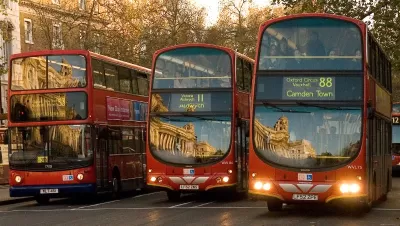Many cities in Europe are rediscovering their pre-automobile roots, using new technologies like ride-sharing and congestion pricing and old-fashioned ones like demolishing parking lots and dense development. Car ownership is dropping precipitously.

With their cozy streetscapes and mature public transit systems, European cities already have relatively low rates of automobile use. But that doesn't stop them from going big. Cities from Lyon to Birmingham to Munich are aggressively introducing programs and development patterns to make driving harder and car-sharing, walking, biking, and riding public transit easier.
“Sharing is the new paradigm of urban mobility. Tomorrow, you will judge a city according to what it is adding to sharing. The more that we have people sharing transportation modes, public space, information and new services, the more attractive the city will be.”
"'Multi-modal' and 'interconnectivity' are now the words on every urban planner’s lips. In Munich, says Bore, planners told him that the city dwellers of the future would no longer need cars. Bikes and more efficient public transport would be the norm; for occasional trips out of the city, they could hire a car or join a car club that facilitated inter-city travel. The statistic everyone trots out is that your car sits outside, idle and depreciating, for 96% of its life. There has to be a more efficient way to provide for the average of seven hours a week when you want it."
"The statistic (London neighborhood) Hackney is proudest of is that more than 15% of its residents commute to work by bike. “It’s about creating an environment where it’s easier for people to cycle or take the bus, so they’re not relying on cars,” Demirci says. Car ownership in the borough has dropped over the past 10 years: whereas a decade ago 56% of households did not own a car, that figure now stands at 65%."
FULL STORY: End of the car age: how cities are outgrowing the automobile

Planetizen Federal Action Tracker
A weekly monitor of how Trump’s orders and actions are impacting planners and planning in America.

Map: Where Senate Republicans Want to Sell Your Public Lands
For public land advocates, the Senate Republicans’ proposal to sell millions of acres of public land in the West is “the biggest fight of their careers.”

Restaurant Patios Were a Pandemic Win — Why Were They so Hard to Keep?
Social distancing requirements and changes in travel patterns prompted cities to pilot new uses for street and sidewalk space. Then it got complicated.

Platform Pilsner: Vancouver Transit Agency Releases... a Beer?
TransLink will receive a portion of every sale of the four-pack.

Toronto Weighs Cheaper Transit, Parking Hikes for Major Events
Special event rates would take effect during large festivals, sports games and concerts to ‘discourage driving, manage congestion and free up space for transit.”

Berlin to Consider Car-Free Zone Larger Than Manhattan
The area bound by the 22-mile Ringbahn would still allow 12 uses of a private automobile per year per person, and several other exemptions.
Urban Design for Planners 1: Software Tools
This six-course series explores essential urban design concepts using open source software and equips planners with the tools they need to participate fully in the urban design process.
Planning for Universal Design
Learn the tools for implementing Universal Design in planning regulations.
Heyer Gruel & Associates PA
JM Goldson LLC
Custer County Colorado
City of Camden Redevelopment Agency
City of Astoria
Transportation Research & Education Center (TREC) at Portland State University
Camden Redevelopment Agency
City of Claremont
Municipality of Princeton (NJ)



























